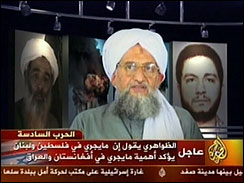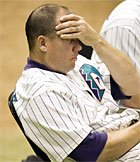I couldn't resist posting this piece I found at
slate.com Of course, all presidents have spun the truth, but I believe Bush simply takes it to a
new level-- lying, either without knowledge or remorse (and, perhaps, both). Truth is clearly at a premium in Washington and unvarnished information is seen less frequently than an atheist politician. The collection and dissemination of both public and private information is dominated by fewer and fewer interests each day, making the
open and deliberative society sought by Bill Moyers an impossibility.
If you need more evidence that we now live in an age where access to primary source information is dwindling, witness the Bush administration's overzealous use of the
"state secrets" doctrine and gross extension of the national security classification scheme that has led to the classification of
twice as many government documents in 2005 as in 2001. The numbers used in that comparison do not include the documents classified by the Vice President's office, which has
refused since 2002 to report the number of documents it has classified. It also does not include the number of documents
seized from the National Archives and "ununclassified." It seems that any information you now receive is either diluted or inflated, but never pure. And that's only the information that's not classified.
Take, for example, a recent
FOIA request to the FBI for any documents pertaining to connections between
Al-Qaeda and certain charitable organizations. The FBI's response:
we don't have any documents relevant to that query. A similar
FOIA request to the CIA seeking documents relevant to the relationship between Bin Laden and Mullah Omar (head of the deposed Taliban) was denied on the basis that
"it is the CIA policy neither to confirm nor deny the existence or nonexistence of any CIA records." Essentially, then, the CIA's policy is not only to flatly deny FOIA requests without justification, but to simply pretend that they do not have any records whatsoever.
Your thoughts, as always, are welcome. Use the comment link at the end of this (and every) post.
When Presidents FibLittle lies matter, too.
By John Dickerson
Posted Wednesday, May 31, 2006, at 6:41 PM ET
John Snow leaving the Treasury Department was an open secret for many months. There seemed no end to the list of names floated as possible replacements. First it was going to be Chief of Staff Andy Card, then Deputy Secretary of State Robert Zoellick, then Commerce Secretary Carlos Gutierrez, and then former Commerce Secretary Don Evans. The manager at my Starbucks may have gotten feelers. When the president was asked at his press conference last week whether he had any indication Snow intended to leave, I thought he might say, "Is he still in my Cabinet?"
We now know that would have been a reasonable answer. Four days earlier, Hank Paulson had agreed to replace Snow. Bush also could have simply said yes, because as Snow
later put it, Bush knew for some time that he was thinking of doing so. Instead, the president answered in a way that was not, to use a White House term, reality-based. "Has he given you any indication he intends to leave his job any time soon?"
Bush was asked. The president responded: "No, he has not talked to me about resignation. I think he's doing a fine job."
The New York Times called this answer "artful." That's not the word I'd use. Artful should be reserved for things that hide the truth but don't deceive. A hat is artful. A toupee is a lie. Bush's answer was toupee-like. Even if it was technically true that Bush had not talked to Snow about "resignation," the president knew his confected statement was deceptive. I'm reluctant to call it a lie, but the president abused our trust.
We allow presidents a measure of obfuscation because in public they must give nuanced answers in some sensitive areas like national security. On personnel matters like this one, the public's right to know is not done grave harm when a president is less than candid. Bush is also protected by a less-honorable Washington tradition: the departure fiction where even if someone has been fired, he is described as having gone at his own behest, often to spend more time with his family.
Such wiggle-room prerogatives allow the president to duck many questions, as he has in the past. When the press has tried to ask about his flexibility on a particular piece of legislation, he has refused to speculate about what compromise he might accept, saying, "I won't negotiate with myself." When reporters try to get him to make news, he regularly refuses to "play that Washington" game. Richard Keil of Bloomberg was certainly trying to get Bush to play a round of that game by asking him to talk about Snow's intentions. But when asked in March about staff changes and calls from outside his administration for a shakeup, the president was careful to give nothing away without fibbing. "I'm not going to announce it right now," he said. "Look, they've got some ideas that I like and some I don't like. Put it that way."
These are
unhelpful answers but they're not deceitful. There are times when administration officials have told me the back story behind a non-answer and it all makes sense. In this case, though, the president jumped over the menu of bland dodges available to him and picked the least truthful statement short of "Secretary Snow is staying." When asked about this answer yesterday, press spokesman Tony Snow explained that the president didn't misspeak. He was worried about spooking financial markets and wanted Paulson's background checks to go through before he announced the change. The president was also likely being sensitive about John Snow, who has been a dead man walking for so many months. Bush wanted to give him a proper send-off.
But those motivations don't explain why the president avoided the gentle euphemism and instead reached out to mislead. Snow ultimately fell back on the Clinton defense. "It was very carefully worded," he
said of the president's answer. That's not encouraging. When a person hears a question, dissects it, and fashions an answer on the spot that deceives, it suggests a lot of practice and comfort with fibbing. This is a problem area for Bush: Fifty-six percent of the country does not find him trustworthy,
according to recent polls.
In Washington, we often say politicians are "misleading." That's the kind of thinking President Bush usually resists. He often talks about his Midland, Texas, heritage when he wants to convey his moral compass. There, a man's word is sealed with his handshake. In Midland, they would have called what Bush said about John Snow a lie.
John Dickerson is Slate's chief political correspondent. He can be reached at
slatepolitics@gmail.com



